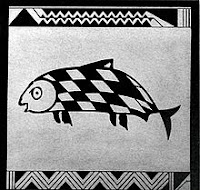 |
| Wikipedia photos & pictures |
Here, for ABC Wednesday, I will have to use a Roger Green approach to posting: full of knowledge, ancient and arcane.
 |
Giant grouper swimming
among schools of other fish
|
Ichthyology is the branch of zoology devoted to the study of fish. This includes skeletal fish (Osteichthyes), cartilaginous fish (Chondrichthyes), and jawless fish (Agnatha). While a large number of species have been discovered and described, approximately 250 new species are officially described by science each year. According to FishBase, 32,200 species of fish had been described by March 2012. There are more fish species than the combined total of all other vertebrates: mammals, amphibians, reptiles and birds.
 |
Head-on view of
|
The practice of ichthyology is associated with marine biology, limnology and fisheries science. People who study ichthyology are called ichthyologists.
The study of fish receives its origins from human's desire to feed, clothe, and equip themselves with useful implements. According to Michael Barton, a prominent ichthyologist and professor at Centre College, "the earliest ichthyologists were hunters and gatherers who had learned how to obtain the most useful fish, where to obtain them in abundance, and at what times they might be the most available". Early cultures manifested these insights in abstract and identifiable artistic expressions.
 |
Dunkleosteus was a gigantic,
10 meter (33 feet) long
|
Aristotle incorporated ichthyology into formal scientific study. Between 335 BC–322 BC, he provided the earliest taxonomic classification of fish, accurately describing 117 species of Mediterranean fish. Furthermore, Aristotle documented anatomical and behavioral differences between fish and marine mammals.
The Romans, although less devoted to science, wrote extensively about fish. Pliny the Elder, a notable Roman naturalist, compiled the ichthyological works of indigenous Greeks. Pliny's documentation was the last significant contribution to ichthyology until the European Renaissance.
 |
|
is a lobe-finned fish which
is a living fossil.
Lungfish evolved the first
proto-lungs and proto-limbs.
They developed the ability to
live outside a water environment
in the middle Devonian
(397-385 Ma), and have
remained virtually the same
for over 100 million years.
|
Adventurous individuals such as John James Audubon figure in the faunal documentation of North America.
Louis Agassiz of Switzerland established his reputation through the study of freshwater fish and organisms and the pioneering of paleoichthyology.
Ichthyologists...study all types of fish. Since (their work) may require fieldwork, including being in or on the water for long periods of time, physical fitness and a curiosity for nature are important requirements for this profession.
Ichthyologists may work for universities, museums, private companies and government agencies. They study all aspects of fish species, including natural history, behavior, reproductive habits and growth patterns. In addition to their studies, museum ichthyologists may take part in educating the public about fish species and conservation awareness. University scientists primarily conduct research and may also teach courses in ichthyology, marine biology or related areas.
14 comments:
When I hear of a new species of anything being discovered, I am always amazed. 250 a year? Incredible!
I've never been an adjective before - thanks!
ROG, ABC Wednesday team
Fish are strange and facinating creatures.
I have to say I have never known an Ichthyologist.
Hari OM
...education plus!!! This was fun reading though - and the piccies make me hanker for a dip in that Aussie sea!! YAM xx
fish, I can take them or leave them, except possibly in a nice sauce.
Do ichthyologists eat fish, do you think?
Perfect words for I week. I'm not particularly interested in fish except for the taste of certain ones! lol
Leslie
abcw team
What a great choice for I, - I have never known an Ichthyologists but they must be great conversationalists with all that information...
Hi Kay, I didn't know that fish were such an extensive species. Very interesting! Thanks for your visit and comment. I shall write about Rube Goldberg when the letter R is having its turn!
Have a great week.
Wil, ABCW Team.
Seems there is something ichthy going on here. :)
An Arkie's Musings
Ichthyologists - If they have to know all that they must have a great memory. I only enjoy fish, even then just certain kinds of fish. Thanks Kay!
Hank
I tend to study fish like salmon and halibut! i joke but i have huge respect for just about all zoologists and botanists. Thanks, Kay. This is karin - of manicddaily. k.
An excellent I word. So much in the sea left to discover and there sure are a lot of strange things down there.
Joy - ABC Team
What a fascinating word and profession.
Ann
And all I want to do is eat them in deep fried batter!
Post a Comment